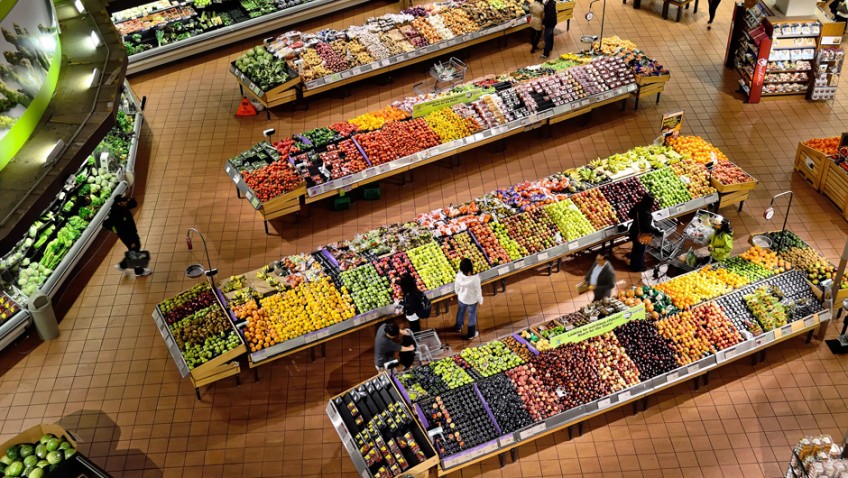Food is one of the most important factors in our lives. we need it to maintain our bodies so what and how we eat is vital says Christine Parkinson
In the UK we have access to a good, varied, and affordable diet which we often take for granted. With many farmers struggling and the obesity epidemic growing surely it is time to look again at our consumption.
Questions we should be asking about food are:
- Is it healthy and nutritious?
- Is it environmentally friendly?
- Is its production sustainable for farmers and producers?
- Is it beneficial for our economy?
Sustainable systems
Having a more sustainable food system – economically, socially and environmentally – would mean achieving healthier diets, lower food wastage and the production and consumption of higher quality foods with a lower impact, particularly when it comes to freshwater resources, climate change and biodiversity.
We all have an important role to play in making supply chains more environmentally friendly and fostering changes in consumer behaviour.
Information from the Sustain organisation, which is dedicated to raising awareness of this issue, tells us what consumers buy and eat affects the entire value chain. This has repercussions for the whole system of food consumption and production, both inside and outside EU borders.
European consumer habits generate and inspire food production processes, and also influence the global food market. Factors influencing food consumption patterns include demographics, the availability of food products, the economy, cultural and personal preferences, social values, education and health. These elements all play an important role in food preparation and buying decisions.
Food is the household consumption category associated with the highest environmental pressures. The consumption of food and drink causes between 20%–30% of the environmental impact of the total private consumption in Europe, thereby making it one of the areas of consumption with the biggest environmental repercussions. The demand for food requires a significant number of natural resources, such as soil, water and energy, and results in various environmental consequences (emissions, waste etc.) as well as other types (social, economic and health-related etc.), at each and every stage in the production and consumption system.
What you can do?
If you care about how your food is produced, learn about and become an active participant in the food system. As a customer, your food-buying pounds become your weapon, and where you choose to spend your money gives you the power to vote for or against food production methods.
Pick-your-own farms and roadside stands provide access to fresh produce directly from the farmer who grew it. Prices are reduced in exchange for your labour, and the trip to the farm provides an excellent outing for groups of families and friends, particularly children.
Buying organic products supports farmers who do not use chemical pesticides or fertilizers and adhere to federal standards to protect the environment. Organic products provide premium prices to producers for their extra management time and risk. Look for “certified organic” labels when shopping.
Food farming facts
Covering 75% of the UK land mass, how and what we farm has a huge impact on the environment and wildlife, on the economy of rural communities and on our health.
The National Farmers’ Union commissioned a survey by YouGov which revealed that:
86% of shoppers want to buy more traceable food that has been produced on British farms. 78% think that supermarkets should sell more food from British farms. In 2012, Britain’s farmers produced 62% of the nation’s food.
On behalf of British farmers, the NFU are asking:
- Retailers to be clear and transparent about how they source British products. This should be underpinned with fair relationships across the whole supply chain.
- To see British food clearly labelled, with a Red Tractor logo or union flag so that customers can easily identify where the product is sourced from.
- Every retailer to sign up to the Back British Farming Charter and commit to fair, mutually beneficial and transparent relationships with farmers and growers.
- Every retailer to sign the NFU Fruit and Veg Pledge to commit to fair relationships with farmers and growers.
While the supermarkets make vast profits and encourage us to buy more the nation is creating mountains of waste putting pressure on health and other resources.
From field to fork
The Soil Association is promoting this month as Organic September. As part of their campaign they are asking:
“Do you want to know exactly what’s in your food? All organic food is fully traceable from farm to fork, so you can be sure of what you’re eating. The standards for organic food are laid down in European law so any food labelled as organic must meet strict rules.
Organic food is produced on organic farms using a more natural but strictly controlled system of farm management. Unlike non-organic food production, which makes wide use of manufactured and mined fertilisers and pesticides, organic food is produced with natural fertilisers from plants, less energy and more respect for the animals that provide it.
How we farm really does affect the quality of the food we eat. Ground breaking research published in the British Journal of Nutrition has found significant nutritional differences between organic and non-organic farming.”
Whether you decide to go organic or just pay more attention to what you serve at mealtimes, there is plenty of information out there that could see us all benefiting from treating food more responsibly.


